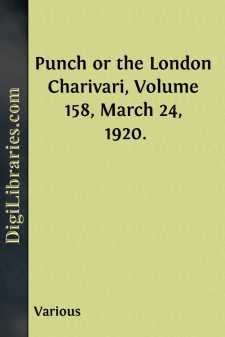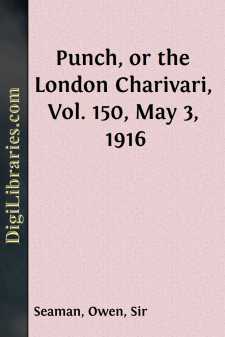Periodicals
- Art 27
- Children's periodicals 59
- Entertainment 5
- Food/Wine 2
- Games/Humor
- General 661
- Health 1
- History 53
- House/Home 1
- Regional 62
- Science/Nature 118
- Transportation 10
Games/Humor Books
Sort by:
by:
Various
A FLAT TO LET. It was twelve o'clock (noon) and I was sitting over the fire in our squalid lodgings reading the attractive advertisements of country mansions in a weekly journal. I had just decided on a delightful Tudor manor-house with every modern convenience, a nice little park and excellent fishing and shooting, when Betty burst upon me like a whirlwind. Her face was flushed and a fierce light...
more...
by:
Various
MAN AND WIVES. A TRAVESTY. By MOSE SKINNER. CHAPTER FIFTH. QUEER DOINGS AT THE HALF-WAY HOUSE. "Tell the minister," said ANN to TEDDY, "to come in. If I don't get a husband out of this somehow, I ain't smart. I'll just marry the man I've got here." ARCHIBALD sank down on the sofa, bathed in a cold perspiration. "Oh, don't" he groaned; "you...
more...
by:
Owen Seaman
May 3, 1916. Sir Roger Casement, it appears, landed in Ireland from a collapsible boat. And by a strange coincidence his arrival synchronised with the outbreak of a collapsible rebellion. Hard soap can now be obtained in Germany only by those who purchase bread tickets. The soft variety cannot be obtained at all, the whole supply, it seems, having been commandeered by the Imperial Government for export...
more...
by:
Owen Seaman
August 26, 1914. An eclipse of the sun took place on Friday last. It is supposed to have been an attempt on the part of the sun to prevent the Germans finding a place in it. South Africa has now declared with no uncertain voice that she intends to fight under the British Flag, and the Kaiser's vexation on realising that the money spent on a certain famous telegram was sheer waste is said to have...
more...
by:
Various
CHARIVARIA. Bohemia has decided to have a Coalition Government. Several London morning papers are prepared to offer them one in good going condition, providing they pay cost of transit. According to a contemporary, "rabbits are worth less when they are skinned by the shopkeeper." So is the customer. "It is of greater advantage to know the Welsh language," says Professor Trow, "than...
more...
by:
Various
FORCE OF HABIT. The fact that George had been eighteen months in Gallipoli, Egypt and France, without leave home till now, should have warned me. As it was I merely found myself gasping "Shell-shock!" We were walking in a crowded thoroughfare, and George was giving all the officers he met the cheeriest of "Good mornings." It took people in two ways. Those on leave, blushing to think...
more...
Chorus of Female Spectators. We shall see better here than what we did last Droring-Room. Law, 'ow it did come down, too, pouring the 'ole day. I was that sorry for the poor 'orses!... Oh, that one was nice, Marire! Did you see 'er train?—all flame-coloured satting—lovely! Ain't them flowers beautiful? Oh, Liza, 'ere's a pore skinny-lookin' thing coming...
more...
by:
Various
No Amateur Reciter can consider himself fully equipped for the Drawing-room or Platform unless he is furnished with at least one poem in dialect, and Mr. Punch has accordingly commissioned from his Poet a recitation couched in the well-known vernacular of Loompshire. Loompshire, it need hardly be explained, is the county where most of the stage-rustics come from. The author of this little poem ventures...
more...
by:
Various
VOCES POPULI. AT THE MILITARY EXHIBITION. IN THE AVENUE FACING THE ARENA. An Unreasonable Old Lady (arriving breathless, with her grandson and niece). This'll be the place the balloon goes up from, I wouldn't miss it for anything! Put the child up on that bench, MARIA; we'll stand about here till it begins. Maria. But I don't see no balloon nor nothing. [Which, as the foliage blocks...
more...
by:
Various
His name, PUNCHINELLO hopes, will not be found a difficult one to articulate. He flatters himself that it has a smack of grape-juice and olives about it. It rhymes with "mellow," which naturally brings us to "good fellow.". On occasions PUNCHINELLO can "bellow," cut a "tremendous swell," O, and he never throws away a chance of pocketing the "yellow." He would...
more...











